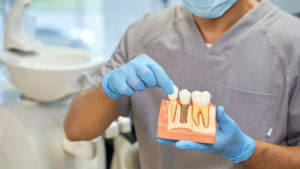Dental implants, bridges, dentures — if you have a missing tooth, you may already be familiar with the options to fill the gap.
However, while missing teeth might seem like an aesthetic concern, especially if it’s not one of the ‘social six’ teeth you see when you smile, it’s important from an oral health standpoint that you fill the gap as soon as possible1 to protect the surrounding teeth and your gums.
Implants are typically a more expensive treatment than bridges and dentures, but they are also one of the best long-term oral health and aesthetic investments you can make.
If you need to know why we may recommend them for you — and what the full list of benefits for having dental implants are — keep reading.
What is a dental implant?
What we refer to as a tooth implant is actually two separate fittings: the implant itself is the ‘foundation’, embedded into the jawbone, that holds in place the artificial tooth, known as a crown.
First, a fitting made of a strong metal (normally titanium) is inserted into the jawbone (beneath the gumline) in the gap of the missing tooth. A small portion of this fitting appears above the gumline.
Then, a crown — made of porcelain, metal or ceramic to mimic the look and hardness of a real tooth — is placed onto the base provided by the implant.
Our implant specialist, Dr. Ruben Garcia, explains what an implant is, and what impact implant treatment has had on patients’ quality of life.
Why might you need a dental implant?
Dental implants, as well as other ‘fittings’ such as bridges or dentures, are used as a treatment in one of three situations:
- To fill in a gap in between teeth.
- To replace a tooth (or teeth) that cannot be recovered by other treatments due to significant decay or damage.
- To fill in a gap, as well as a set of missing, or significantly damaged surrounding teeth. In this instance, we often use two or more implants to support a bridge (several artificial teeth attached together).
However, in some cases, a dentist will have to choose between recommending a bridge or an implant. But, what is the difference?
What is the difference between a dental implant and a bridge?
As we have explained, a dental implant is a crown affixed to an implant ‘base’ that is embedded into the jawbone.
Likewise, a bridge is also an artificial tooth, made to fill in a gap in between missing teeth.
However, the main difference is that a bridge is anchored on the teeth surrounding the gap — not onto a fitting embedded in the jawbone.
There are many more differences in terms of treatment time and costs that vary between bridges and implants, which you can learn about by reading our respective dental bridges and dental implants guides.
So, now that we understand more about implants – why would a dentist recommend them over bridges or an implant?
What are the benefits of getting dental implants?
1. They are far more comfortable than having a gap in between your teeth
Dental implants are highly secure and highly comfortable — more so than removable dentures, and definitely more so than having a gap in your teeth.
This is because implants are designed and fitted to your mouth, and are designed for you to be able to rest your teeth in a comfortable position.
Implants are also vital for letting you chew and speak normally: with a full set of teeth, pressure when moving or resting your teeth is evenly distributed2, which can resolve a major source of grinding or discomfort if you have a gap in your teeth.
2. Implants help you maintain excellent oral health
Implants are vital for maintaining a high level of oral health and hygiene. Where there are gaps, the surrounding teeth can shift, causing sensitivity, discomfort (e.g. toothache)3 and creating difficult-to-clean areas where bacteria can multiply, provoking gum problems and bad breath.
Where there is a gap where a tooth should be, the jawbone can also progressively lose density, which can lead to ‘facial collapse’ where the mouth and jaw area appears to sag4. Implants can prevent this by ‘fusing’ with the jawbone and helping it retain its normal health and structure5.
3. They give you back your smile, and your confidence
Missing a tooth doesn’t just come with oral health challenges — it can change your smile and the structure of your jaw, which can undoubtedly affect your confidence.
It’s a scientific fact that implants can help to restore self-esteem6, but you don’t need us to tell you how important it is to have a beautiful smile.
That is why we design implants to replace your missing tooth/teeth as seamlessly as possible and give you the confidence to smile naturally again.
Considering dental implant treatment in Hammersmith?
One of the most important benefits of dental implants — beyond the oral health and confidence benefits — is that they are a long-lasting solution to filling the gaps in your teeth7.
Implants can last more than a decade, even two, and require little maintenance beyond your normal dental hygiene routine and regular dental check-ups.
This is why, when considering the cost, which is higher than a bridge or dentures, you must know that it may still be very much worth the investment in the long run.
However, you won’t have to make the right decision without support. Our dental experts will always advise on the best course of action for your dental health in the case of a missing tooth at a treatment cost that is appropriate for you.
So, if you live in or near Hammersmith and are looking for solutions to bridge a gap in your teeth, don’t hesitate to visit us to understand your best course of action.
Book a consultation with us today to discuss our Hammersmith dental implant services or call our friendly reception team on 020 3811 2969.
This information in this article has been written and verified for accuracy by the 92 Dental staff.
- Specialist Periodontist and Implantologist: Dr. Ruben Garcia
- Principal Dentist: Dr. Moira Baldiraghi
References:
1 – Garcia-Sánchez, R, Dopico, J. et al., “Comparison of clinical outcomes of immediate versus delayed implants…” (January 2022), https://onlinelibrary.wiley.com/doi/full/10.1111/clr.13892
2 – Kayumi, S., Takayama, Y., et al., “Effect of bite force in occlusal adjustment of dental implants…” International Journal of Implant Dentistry (June 2015), https://link.springer.com/article/10.1186/s40729-015-0014-2
3- Karthikeyan V., Parween, S., et al., “Tooth mobility measurements, realities and limitations”, Journal of Evolution of Medical and Dental Sciences (April 2019), https://www.researchgate.net/publication/333164498_TOOTH_MOBILITY_MEASUREMENTS-_REALITIES_AND_LIMITATIONS
4- Pucciarelli M., Toyoshima G., et al, “Quantifying the facial proportions in edentulous individuals…”, Clinical Oral Implants Research, The Journal of Prosthetic Dentistry (April 2024), https://www.sciencedirect.com/science/article/abs/pii/S0022391322001883
5 – Raghavendra S. J. and Dhinakarsamy, V., “Osseointegration”, Journal of Pharmacy and Bioallied Sciences (April 2015), https://www.ncbi.nlm.nih.gov/pmc/articles/PMC4439679
6 – Nordenram, G., Davidson, T., et al, “Qualitative studies of patients’ perceptions of loss of teeth…”, Acta Odontologica Scandinavica (October 2012), https://www.tandfonline.com/doi/abs/10.3109/00016357.2012.734421
7 – Balshi,T., Wolfinger, G., et al., “A long-term retrospective analysis of survival rates of implants…”, International Journal of Oral & Maxillofacial Implants (November 2015), https://www.researchgate.net/publication/284164764_A_Long-term_Retrospective_Analysis_of_Survival_Rates_of_Implants_in_the_Mandible




